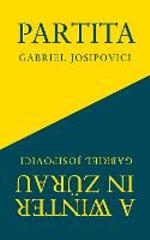Partita; Fiction and non-fiction are two sides of the same coin. Or are they? Michael Penderecki is in flight. Someone has threatened to kill him. But who is the woman dead in the bathtub? And why does the voice of Yves Montand singing ‘Les Feuilles Mortes’ surge from the horn of an antiquated phonograph in an otherwise silent villa in Sils Maria? This is the most enigmatic – and melodramatic – of Gabriel Josipovici’s novels to date. It is as though one of Magritte’s paintings had come to life to the rhythms of a Bach Partita. A Winter in Zurau; Fiction and non-fiction are two sides of the same coin. Or are they? Franz Kafka is in flight. After spitting blood and being diagnosed with tuberculosis in the summer of 1917, his thirty-fourth year, he escapes from Prague to join his sister Ottla in her smallholding in Upper Bohemia. He leaves behind, he hopes, a dreaded office job, a dominating father, an importunate fiancee and the hothouse literary culture of his native city. Free of all this, he believes, he will at last be able to make sense of his existence and of his strange compulsion to write stories and novels which, he knows, will bring him neither fame nor financial reward. But this is not fiction. It is an exploration of eight crucial months in the life of one of the greatest writers of the twentieth century, months of anguish and reflection preserved for us in his letters and journals of the time, and which resulted not just in the production of the famous Aphorisms but, as Josipovici shows in this compelling study, of some of his most resonant parables and story-fragments.

Partita and a winter in Zurau
ISBN: 9781800174313
Format: Paperback
Publisher: Carcanet Press
Origin: GB
Release Date: August, 2024


